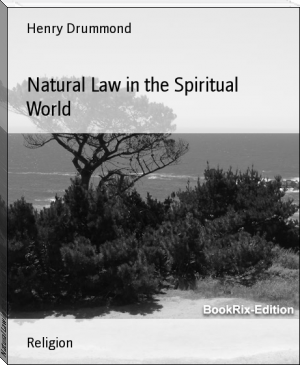Natural Law in the Spiritual World - Henry Drummond (feel good novels txt) 📗

- Author: Henry Drummond
Book online «Natural Law in the Spiritual World - Henry Drummond (feel good novels txt) 📗». Author Henry Drummond
life, never hears the jar of the machinery by which he tries to manufacture his own good points, till he has stood in the stillness of such a presence. Then he discerns the difference between growth and work. He has considered the lilies, how they grow.
We have now seen that spiritual growth is a process maintained and secured by a spontaneous and mysterious inward principle. It is a spontaneous principle even in its origin, for it bloweth where it listeth; mysterious in its operation, for we can never tell whence it cometh; obscure in its destination, for we cannot tell whence it goeth. The whole process therefore transcends us; we do not work, we are taken in hand--"it is God which worketh in us, both to will and to do of His good pleasure." We do not plan--we are "created in Christ Jesus unto good works, which God hath before ordained that we should walk in them."
There may be an obvious objection to all this. It takes away all conflict from the Christian life? It makes man, does it not, mere clay in the hands of the potter? It crushes the old character to make a new one, and destroys man's responsibility for his own soul?
Now we are not concerned here in once more striking the time-honored "balance between faith and works." We are considering how lilies grow, and in a specific connection, namely, to discover the attitude of mind which the Christian should preserve regarding his spiritual growth. That attitude, primarily, is to be free from care. We are not lodging a plea for inactivity of the spiritual energies, but for the tranquillity of the spiritual mind. Christ's protest is not against work, but against anxious thought; and rather, therefore, than complement the lesson by showing the other side, we take the risk of still further extending the plea in the original direction.
What is the relation, to recur again to analogy, between growth and work in a boy? Consciously, there is no relation at all. The boy never thinks of connecting his work with his growth. Work in fact is one thing and growth another, and it is so in the spiritual life. If it be asked therefore, Is the Christian wrong in these ceaseless and agonizing efforts after growth? the answer is, Yes, he is quite wrong, or at least, he is quite mistaken. When a boy takes a meal or denies himself indigestible things, he does not say, "All this will minister to my growth;" or when he runs a race he does not say, "This will help the next cubit of my stature." It may or it may not be true that these things will help his stature, but, if he thinks of this, his idea of growth is morbid. And this is the point we are dealing with. His anxiety here is altogether irrelevant and superfluous. Nature is far more bountiful than we think. When she gives us energy she asks none of it back to expend on our own growth. She will attend to that. "Give your work," she says, "and your anxiety to others; trust me to add the cubits to your stature." If God is adding to our spiritual stature, unfolding the new nature within us, it is a mistake to keep twitching at the petals with our coarse fingers. We must seek to let the Creative Hand alone. "It is God which giveth the increase." Yet we never know how little we have learned of the fundamental principle of Christianity till we discover how much we are all bent on supplementing God's free grace. If God is spending work upon a Christian, let him be still and know that it is God. And if he wants work, he will find it there--in the being still.
Not that there is no work for him who would grow, to do. There is work, and severe work--work so great that the worker deserves to have himself relieved of all that is superfluous during his task. If the amount of energy lost in trying to grow were spent in fulfilling rather the conditions of growth, we should have many more cubits to show for our stature. It is with these conditions that the personal work of the Christian is chiefly concerned. Observe for a moment what they are, and their exact relation. For its growth the plant needs heat, light, air, and moisture. A man, therefore, must go in search of these, or their spiritual equivalents, and this is his work? By no means. The Christian's work is not yet. Does the plant go in search of its conditions? Nay, the conditions come to the plant. It no more manufactures the heat, light, air, and moisture, than it manufactures its own stem. It finds them all around it in Nature. It simply stands still with its leaves spread out in unconscious prayer, and Nature lavishes upon it these and all other bounties, bathing it in sunshine, pouring the nourishing air over and over it, reviving it graciously with its nightly dew. Grace, too, is as free as the air. The Lord God is a Sun. He is as the Dew to Israel. A man has no more to manufacture these than he has to manufacture his own soul. He stands surrounded by them, bathed in them, beset behind and before by them. He lives and moves and has his being in them. How then shall he go in search of them? Do not they rather go in search of him? Does he not feel how they press themselves upon him? Does he not know how unweariedly they appeal to him? Has he not heard how they are sorrowful when he will not have them? His work, therefore, is not yet. The voice still says, "Be still."
The conditions of growth, then, and the inward principle of growth being both supplied by Nature, the thing man has to do, the little junction left for him to complete, is to apply the one to the other. He manufactures nothing; he earns nothing; he need be anxious for nothing; his one duty is _to be in_ these conditions, to abide in them, to allow grace to play over him, to be still therein and know that this is God.
The conflict begins and prevails in all its life-long agony the moment a man forgets this. He struggles to grow himself instead of struggling to get back again into position. He makes the church into a workshop when God meant it to be a beautiful garden. And even in his closet, where only should reign silence--a silence as of the mountains whereon the lilies grow--is heard the roar and tumult of machinery. True, a man will often have to wrestle with his God--but not for growth. The Christian life is a composed life. The Gospel is Peace. Yet the most anxious people in the world are Christians--Christians who misunderstand the nature of growth. Life is a perpetual self-condemning because they are not growing. And the effect is not only the loss of tranquillity to the individual. The energies which are meant to be spent on the work of Christ are consumed in the soul's own fever. So long as the Church's activities are spent on growing there is nothing to spare for the world. A soldier's time is not spent in earning the money to buy his armor, in finding food and raiment, in seeking shelter. His king provides these things that he may be the more at liberty to fight his battles. So, for the soldier of the Cross all is provided. His Government has planned to leave him free for the Kingdom's work.
The problem of the Christian life finally is simplified to this--man has but to preserve the right attitude. To abide in Christ, to be in position, that is all. Much work is done on board a ship crossing the Atlantic. Yet none of it is spent on making the ship go. The sailor but harnesses his vessel to the wind. He puts his sail and rudder in position, and lo, the miracle is wrought. So everywhere God creates, man utilizes. All the work of the world is merely a taking advantage of energies already there.[54] God gives the wind, and the water, and the heat; man but puts himself in the way of the wind, fixes his water-wheel in the way of the river, puts his piston in the way of the steam; and so holding himself in position before God's Spirit, all the energies of Omnipotence course within his soul. He is like a tree planted by a river whose leaf is green and whose fruits fail not. Such is the deeper lesson to be learned from considering the lily. It is the voice of Nature echoing the whole evangel of Jesus, "Come unto Me, and I will give you rest."
FOOTNOTES:
[53] University Sermons, pp. 234-241.
[54] See Bushnell's "New Life."
DEATH.
"What could be easier than to form a catena of the most
philosophical defenders of Christianity, who have exhausted language
in declaring the impotence of the unassisted intellect? Comte has
not more explicitly enounced the incapacity of man to deal with the
Absolute and the Infinite than the whole series of orthodox writers.
Trust your reason, we have been told till we are tired of the
phrase, and you will become Atheists or Agnostics. We take you at
your word; we become Agnostics."--_Leslie Stephen._
"To be carnally minded is Death."--_Paul._
"I do not wonder at what men suffer, but I wonder often at what they
lose."--_Ruskin._
"Death," wrote Faber, "is an unsurveyed land, an unarranged Science." Poetry draws near Death only to hover over it for a moment and withdraw in terror. History knows it simply as a universal fact. Philosophy finds it among the mysteries of being, the one great mystery of being not. All contributions to this dead theme are marked by an essential vagueness, and every avenue of approach seems darkened by impenetrable shadow.
But modern Biology has found it part of its work to push its way into this silent land, and at last the world is confronted with a scientific treatment of Death. Not that much is added to the old conception, or much taken from it. What it is, this certain Death with its uncertain issues, we know as little as before. But we can define more clearly and attach a narrower meaning to the momentous symbol.
The interest of the investigation here lies in the fact that Death is one of the outstanding things in Nature which has an acknowledged spiritual equivalent. The prominence of the word in the vocabulary of Revelation cannot be exaggerated. Next to Life the most pregnant symbol in religion is its antithesis, Death. And from the time that "If thou eatest thereof thou shalt surely die" was heard in Paradise, this solemn word has been linked with human interests of eternal moment.
Notwithstanding the unparalleled emphasis upon this term in the Christian system, there is none more feebly expressive to the ordinary mind. That mystery which surrounds the word in the natural world shrouds only too completely its spiritual import. The reluctance which prevents men from investigating the secrets of the King of Terrors is for a certain length entitled to respect. But it has left theology with only the vaguest materials to construct a doctrine which, intelligently enforced, ought to appeal to all men with convincing power and lend
We have now seen that spiritual growth is a process maintained and secured by a spontaneous and mysterious inward principle. It is a spontaneous principle even in its origin, for it bloweth where it listeth; mysterious in its operation, for we can never tell whence it cometh; obscure in its destination, for we cannot tell whence it goeth. The whole process therefore transcends us; we do not work, we are taken in hand--"it is God which worketh in us, both to will and to do of His good pleasure." We do not plan--we are "created in Christ Jesus unto good works, which God hath before ordained that we should walk in them."
There may be an obvious objection to all this. It takes away all conflict from the Christian life? It makes man, does it not, mere clay in the hands of the potter? It crushes the old character to make a new one, and destroys man's responsibility for his own soul?
Now we are not concerned here in once more striking the time-honored "balance between faith and works." We are considering how lilies grow, and in a specific connection, namely, to discover the attitude of mind which the Christian should preserve regarding his spiritual growth. That attitude, primarily, is to be free from care. We are not lodging a plea for inactivity of the spiritual energies, but for the tranquillity of the spiritual mind. Christ's protest is not against work, but against anxious thought; and rather, therefore, than complement the lesson by showing the other side, we take the risk of still further extending the plea in the original direction.
What is the relation, to recur again to analogy, between growth and work in a boy? Consciously, there is no relation at all. The boy never thinks of connecting his work with his growth. Work in fact is one thing and growth another, and it is so in the spiritual life. If it be asked therefore, Is the Christian wrong in these ceaseless and agonizing efforts after growth? the answer is, Yes, he is quite wrong, or at least, he is quite mistaken. When a boy takes a meal or denies himself indigestible things, he does not say, "All this will minister to my growth;" or when he runs a race he does not say, "This will help the next cubit of my stature." It may or it may not be true that these things will help his stature, but, if he thinks of this, his idea of growth is morbid. And this is the point we are dealing with. His anxiety here is altogether irrelevant and superfluous. Nature is far more bountiful than we think. When she gives us energy she asks none of it back to expend on our own growth. She will attend to that. "Give your work," she says, "and your anxiety to others; trust me to add the cubits to your stature." If God is adding to our spiritual stature, unfolding the new nature within us, it is a mistake to keep twitching at the petals with our coarse fingers. We must seek to let the Creative Hand alone. "It is God which giveth the increase." Yet we never know how little we have learned of the fundamental principle of Christianity till we discover how much we are all bent on supplementing God's free grace. If God is spending work upon a Christian, let him be still and know that it is God. And if he wants work, he will find it there--in the being still.
Not that there is no work for him who would grow, to do. There is work, and severe work--work so great that the worker deserves to have himself relieved of all that is superfluous during his task. If the amount of energy lost in trying to grow were spent in fulfilling rather the conditions of growth, we should have many more cubits to show for our stature. It is with these conditions that the personal work of the Christian is chiefly concerned. Observe for a moment what they are, and their exact relation. For its growth the plant needs heat, light, air, and moisture. A man, therefore, must go in search of these, or their spiritual equivalents, and this is his work? By no means. The Christian's work is not yet. Does the plant go in search of its conditions? Nay, the conditions come to the plant. It no more manufactures the heat, light, air, and moisture, than it manufactures its own stem. It finds them all around it in Nature. It simply stands still with its leaves spread out in unconscious prayer, and Nature lavishes upon it these and all other bounties, bathing it in sunshine, pouring the nourishing air over and over it, reviving it graciously with its nightly dew. Grace, too, is as free as the air. The Lord God is a Sun. He is as the Dew to Israel. A man has no more to manufacture these than he has to manufacture his own soul. He stands surrounded by them, bathed in them, beset behind and before by them. He lives and moves and has his being in them. How then shall he go in search of them? Do not they rather go in search of him? Does he not feel how they press themselves upon him? Does he not know how unweariedly they appeal to him? Has he not heard how they are sorrowful when he will not have them? His work, therefore, is not yet. The voice still says, "Be still."
The conditions of growth, then, and the inward principle of growth being both supplied by Nature, the thing man has to do, the little junction left for him to complete, is to apply the one to the other. He manufactures nothing; he earns nothing; he need be anxious for nothing; his one duty is _to be in_ these conditions, to abide in them, to allow grace to play over him, to be still therein and know that this is God.
The conflict begins and prevails in all its life-long agony the moment a man forgets this. He struggles to grow himself instead of struggling to get back again into position. He makes the church into a workshop when God meant it to be a beautiful garden. And even in his closet, where only should reign silence--a silence as of the mountains whereon the lilies grow--is heard the roar and tumult of machinery. True, a man will often have to wrestle with his God--but not for growth. The Christian life is a composed life. The Gospel is Peace. Yet the most anxious people in the world are Christians--Christians who misunderstand the nature of growth. Life is a perpetual self-condemning because they are not growing. And the effect is not only the loss of tranquillity to the individual. The energies which are meant to be spent on the work of Christ are consumed in the soul's own fever. So long as the Church's activities are spent on growing there is nothing to spare for the world. A soldier's time is not spent in earning the money to buy his armor, in finding food and raiment, in seeking shelter. His king provides these things that he may be the more at liberty to fight his battles. So, for the soldier of the Cross all is provided. His Government has planned to leave him free for the Kingdom's work.
The problem of the Christian life finally is simplified to this--man has but to preserve the right attitude. To abide in Christ, to be in position, that is all. Much work is done on board a ship crossing the Atlantic. Yet none of it is spent on making the ship go. The sailor but harnesses his vessel to the wind. He puts his sail and rudder in position, and lo, the miracle is wrought. So everywhere God creates, man utilizes. All the work of the world is merely a taking advantage of energies already there.[54] God gives the wind, and the water, and the heat; man but puts himself in the way of the wind, fixes his water-wheel in the way of the river, puts his piston in the way of the steam; and so holding himself in position before God's Spirit, all the energies of Omnipotence course within his soul. He is like a tree planted by a river whose leaf is green and whose fruits fail not. Such is the deeper lesson to be learned from considering the lily. It is the voice of Nature echoing the whole evangel of Jesus, "Come unto Me, and I will give you rest."
FOOTNOTES:
[53] University Sermons, pp. 234-241.
[54] See Bushnell's "New Life."
DEATH.
"What could be easier than to form a catena of the most
philosophical defenders of Christianity, who have exhausted language
in declaring the impotence of the unassisted intellect? Comte has
not more explicitly enounced the incapacity of man to deal with the
Absolute and the Infinite than the whole series of orthodox writers.
Trust your reason, we have been told till we are tired of the
phrase, and you will become Atheists or Agnostics. We take you at
your word; we become Agnostics."--_Leslie Stephen._
"To be carnally minded is Death."--_Paul._
"I do not wonder at what men suffer, but I wonder often at what they
lose."--_Ruskin._
"Death," wrote Faber, "is an unsurveyed land, an unarranged Science." Poetry draws near Death only to hover over it for a moment and withdraw in terror. History knows it simply as a universal fact. Philosophy finds it among the mysteries of being, the one great mystery of being not. All contributions to this dead theme are marked by an essential vagueness, and every avenue of approach seems darkened by impenetrable shadow.
But modern Biology has found it part of its work to push its way into this silent land, and at last the world is confronted with a scientific treatment of Death. Not that much is added to the old conception, or much taken from it. What it is, this certain Death with its uncertain issues, we know as little as before. But we can define more clearly and attach a narrower meaning to the momentous symbol.
The interest of the investigation here lies in the fact that Death is one of the outstanding things in Nature which has an acknowledged spiritual equivalent. The prominence of the word in the vocabulary of Revelation cannot be exaggerated. Next to Life the most pregnant symbol in religion is its antithesis, Death. And from the time that "If thou eatest thereof thou shalt surely die" was heard in Paradise, this solemn word has been linked with human interests of eternal moment.
Notwithstanding the unparalleled emphasis upon this term in the Christian system, there is none more feebly expressive to the ordinary mind. That mystery which surrounds the word in the natural world shrouds only too completely its spiritual import. The reluctance which prevents men from investigating the secrets of the King of Terrors is for a certain length entitled to respect. But it has left theology with only the vaguest materials to construct a doctrine which, intelligently enforced, ought to appeal to all men with convincing power and lend
Free e-book «Natural Law in the Spiritual World - Henry Drummond (feel good novels txt) 📗» - read online now
Similar e-books:





Comments (0)